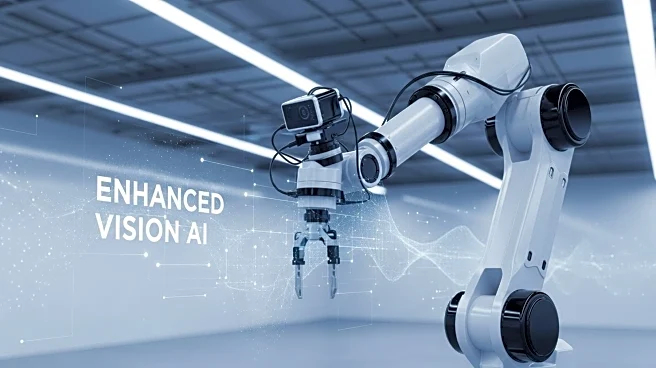What's Happening?
ABB Robotics has announced a strategic investment in LandingAI, a California-based company specializing in vision AI technology. This collaboration aims to integrate LandingAI's vision AI platform, LandingLens, into ABB Robotics' software suite. LandingLens facilitates rapid training of vision AI systems to identify and respond to objects, patterns, or defects without requiring complex programming or AI expertise. ABB Robotics plans to reduce the training and deployment time for robot vision AI by up to 80%, allowing system integrators and end users to retrain AI for new scenarios independently. This initiative is expected to scale robot adoption in dynamic environments beyond traditional manufacturing, particularly in sectors like logistics, healthcare, and food and beverage. ABB is already piloting LandingAI's technology in applications such as item-picking, sorting, depalletizing, and quality inspection.
Why It's Important?
The collaboration between ABB Robotics and LandingAI is significant as it addresses the growing demand for AI in robotics, driven by the need for greater flexibility, faster commissioning cycles, and a shortage of specialist skills required to program and operate robots. By reducing installation and deployment time from weeks to hours, this partnership enables more businesses to automate processes more efficiently. The integration of advanced vision AI technology into robotics can enhance operational capabilities across various industries, potentially leading to increased productivity and reduced costs. This development is particularly relevant for sectors that require rapid adaptation to changing conditions, such as logistics and healthcare.
What's Next?
ABB Robotics plans to continue piloting and integrating LandingAI's technology into its existing vision AI applications. The collaboration is expected to expand the use of autonomous and versatile robots in dynamic environments. As the partnership progresses, ABB Robotics may explore further applications of vision AI technology in other sectors, potentially leading to new innovations in robotic automation. The success of this initiative could encourage other companies to adopt similar technologies, further advancing the field of robotics and AI.









